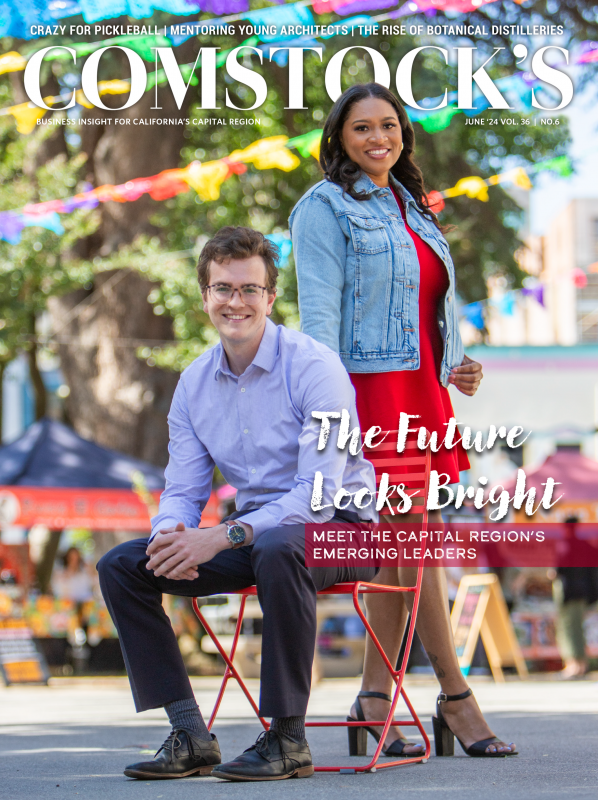Dink. Drill. The Kitchen. Erne. Golden Pickle. If you instantly recognize these terms, you are one of a growing number of people consumed by the fastest growing sport in the U.S.: pickleball. The easy to learn, hard to master, oddly named game now boasts 36.5 million players in the U.S., according to the Association of Pickleball Professionals. The social game, which is governed by USA Pickleball, has been touted as having a low barrier of entry, is suitable for all ages, and is one sport where the tallest, fastest and most athletic don’t necessarily dominate the game. Almost anyone can pick it up.
KCRA news anchor Lisa Gonzales started playing pickleball in middle school, where it was taught as part of physical education in the 1980s and is still taught. She took it up again during the pandemic, setting up a court at home and now she admits she’s “obsessed” with it. “I just loved it. The first day we got our own net, my son and I played five hours straight,” Gonzales says.
She now tries to play daily at Lifetime Fitness, which has a pickleball complex. She also designed her own performance sports dress for the game, which is sold online at the Love Her women’s athleisure shop in Sacramento, with parts of the proceeds going to nonprofits. “It’s good for your brain. The power of sports has been scientifically proven to not only help you live longer, but also fend off dementia and Alzheimer’s.”
Pickleball is a cross between tennis and table tennis and is played on a court that is roughly one quarter the size of a tennis court using paddles and a wiffle ball. The rules are simple, and the game is easy to learn. It took off during the pandemic, when people were craving outdoor time with others, but its origins date back more than 60 years, where the sport was launched in much the same way.
Three Pacific Northwest fathers — former Congressman Joel Pritchard, Bill Bell and Barney McCallum — were trying to keep their families entertained. Looking to alleviate their boredom, Pritchard grabbed some spare ping-pong paddles and a wiffle ball and repurposed an old badminton court on his property. Pritchard’s wife, Joan, named the game pickleball, a reference to the “pickle boat” for leftover rowers in crew races. The game was a hit, and a new sport was born. Now, there are nearly 12,000 places across the country to play — from a simple pickup game in the park to competitive tournaments around the world. Superstar athletes like Tom Brady and LeBron James are investing in pro teams.
The sport has even spawned one of the popular “Dummies” books, “Pickleball for Dummies.” The book is co-written by husband-wife team Carl and Diane Landau, alongside their pickleball trainers Mo Nard and Reine Steel. The Landaus are the co-founders of Pickleball Media and hosts of the podcast “I Used to Be Somebody,” where locals who’ve had significant careers talk about their second-act pursuits following retirement. The monthly podcast ends with a popular five-minute segment called “Pickleball Life Lessons with Mo.”
“Mo is my pickleball instructor, and she is really funny,” says Carl. “Mostly she makes fun of what a bad pickleball player I am.” Carl belongs to the Rio Del Oro Spare Time Sports Club, where he plays pickleball most mornings, and acknowledges that he is content to play at the recreational level. “When I first joined Rio Del Oro, there were 15 of us who basically started playing pickleball at the same time, and I’m still friends with almost all of them,” he says. “We see each other outside of pickleball, and in some ways it’s really changed my life. These are people I would have never met in a million years if it wasn’t for pickleball.”
The social aspect of the sport is one of the top reasons people say they love the game. What started as a sport primarily dominated by seniors is now drawing in players from all ages. Currently, the fastest growing demographic in pickleball is 18-34-year-olds. “My favorite part of the sport is how it spreads across all these generational lines,” says Samantha Martinez, pickleball director for Spare Time Sports Clubs, a members-only club with seven locations in the greater Sacramento region. “We have young players playing with someone decades older than them, and the socializing that happens afterwards is just beautiful.” Six of the Spare Time Sports Clubs have pickleball facilities with a total of 70 pickleball courts.
The Spare Time Sports Club in Roseville, Johnson Ranch Sports Club, has become a pickleball hub for the Capital Region and boasts the largest pickleball complex in Northern California. Johnson Ranch recently hosted its third APP Sacramento Open tournament in March, breaking the record for the largest stop in the history of the tour by drawing in nearly 1,500 players from 39 states and six countries. Red Bluff native Michael Thunder Shaffer — who moved to Sacramento after college — played in the tournament with his playing partner Courtney Blaser, a friend from Redding. Players are ranked according to their age and skill level, ranging from novice at 1.0 to top caliber at 5.5+.The pair entered the mixed doubles, 19-plus, 4.5 skill level division and walked away with the gold medal. “We played a total of seven games and won them all,” says 28-year-old Shaffer. Both he and Blaser received a golden ticket, which provides automatic entry into the APP Nationals Tournament in Arizona in mid-November. Placer Valley Tourism estimates that the tournament brought in approximately $2.5 million to the local economy.
KCRA news anchor Lisa Gonzales started playing pickleball with
her teenage son during the pandemic. Now she plays it almost
every day and designed her own outfit for playing. Photo by Jace
Angelo, courtesy of Love Her Shop, where the dress is sold.

In addition to hosting the tournament, Johnson Ranch holds a twice-monthly event called Friday Night Lights, an evening of pickleball and entertainment complete with a resident DJ. “It used to be populated by an older crowd, but in the last couple of years, I almost feel like it’s a college party,” says Martinez. Twice a month, the Roseville club has free instruction for the community and supplies the equipment. Typically, 50-75 players show up. The burgeoning new sport has also spawned a whole new industry of gear, including various paddles, shoes, balls, bags, grips and clothing. Target has a pickleball clothing line for women. The average pickleball paddle can cost between $35-$200, but rentals are available. Since Spare Time does not have a dedicated pro shop, Martinez sends people to Courtside Tennis and Pickleball for gear, which has locations in Gold River, Sacramento and Oakland.
Many cities are turning derelict tennis and basketball courts into pickleball surfaces or adding pickleball to their repertoires. In February, University of the Pacific opened the first ever college-based pickleball and padel complex alongside its tennis courts. In partnership with San Diego-based Taktika Padel, UOP built eight pickleball courts and four padel courts, which are also open to the public for a small fee. (Padel, a game invented in Mexico in the 1960s, is played on a larger, enclosed court with a ball similar to those used in tennis.) Students and faculty members have access to the courts in the mornings and evenings. A pickleball club has already launched on campus.
“We were open for five minutes, and they already started their first intramural games,” laughs UOP President Christopher Callahan. “Pickleball is just accessible. You can pick up a racket and start playing.”
A new Roseville pickleball complex called Electric Pickle is set to break ground this year, with an anticipated completion date at the end of 2025. The complex will feature 10 pickleball courts, full-service cabanas, a 10,000-square-foot restaurant and some flex space. “This is a super exciting project for us and for the community,” says Wayne Wiley, economic development manager for the City of Roseville. “This is really an entertainment venue.” The new pickleball complex is part of the larger Roseville Junction development, which proposes two new hotels, other eateries as well as an outdoor concert and event space.
Numerous local parks also offer free and open play to the community. That’s where Tracy Houk first learned. The former professional tennis player reached a world ranking of 250 before she was injured and finished her professional career on the senior national tour.
“My sister was coming to stay with me and saw some people playing pickleball in the park and said, ‘Let’s try it.’ She kept bothering me until I agreed to play,” she laughs. That was about three years ago. Houk hasn’t picked up a tennis racket since. “It hit me like they say it does,” she remembers. “I just love it!”
The 62-year-old was all in. She began playing several times a week and worked on her drilling — practicing a specific shot repeatedly — and her game. In addition, she began instructing juniors. Houk is the director of pickleball for juniors at the Johnson Ranch Pickleball Complex, where she teaches a beginning and advanced class; most juniors are between the ages of 7 and 12. “It’s so much fun seeing these kids out there wanting to learn,” she says. She has the players start on the kitchen line — the 7-foot-wide zone on each side of the net known as the non-volley zone — which helps them get their hand-eye coordination down. Once they improve, she has them use the full court.
Houk has also taken her love of the game on the road, visiting local junior high and high schools to extol the benefits of pickleball. She has noticed several schools now adding permanent pickleball courts and pickleball instruction to their physical education curriculum. “For me, it’s about getting kids educated and involved in the game,” she says.
Martinez, the Spare Time pickleball director who first picked up the game six years ago, sums up the surging sport this way: “Anyone, no matter your stature or your size, has an opportunity to win and grow and get better in this sport, and that’s what’s really special about this game,” says Martinez. “What I’ve found is that pickleball is not just a sport; it’s a community. It brings people together from all walks of life.”
Correction June 24, 2024: A previous version of this article misspelled the name Taktika Padel.
–
Get all the profiles in our Young Professionals issue delivered to your inbox: Subscribe to the Comstock’s newsletter today!
Recommended For You
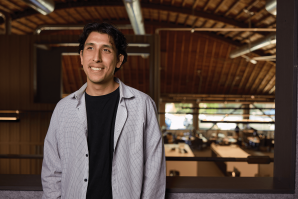
Building the Future
Veteran architects are essential in mentoring young, emerging designers
The field of architecture is changing, and technology is playing a central role, but it’s not the only element that’s shifting: so is the expectation of what young and emerging professionals are looking for in an architectural job.
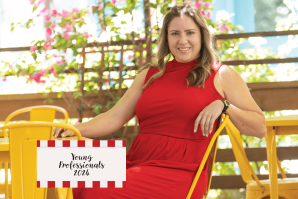
Young Professionals: Katie Hanten
Meet the emerging leaders who envision a bright future for the Capital Region
In 2021, Katie Hanten founded her full-service design and development firm — Vertical Pacific — through which she’s helping evolve the city’s urban core.
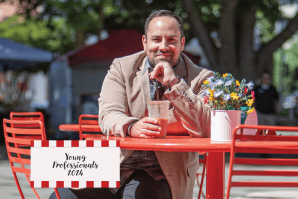
Young Professionals: Jacob Gutierrez-Montoya
Meet the emerging leaders who envision a bright future for the Capital Region
Jacob Gutierrez-Montoya founded Sacramento Contemporary Dance Theatre, whose mission is to translate the work of local nonprofits into art.
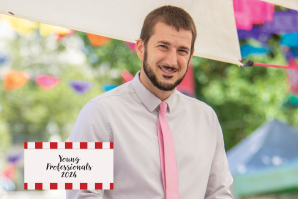
Young Professionals: Kevin Dobson
Meet the emerging leaders who envision a bright future for the Capital Region
Kevin Dobson is founder and executive director of Capital College & Career Academy, a public charter high school that trains teenagers to work in construction.

Some Important Bedfellows: Financial Literacy, Art, Reading and Writing
Comstock’s President and Publisher Winnie Comstock-Carlson examines the shortcomings of California’s public school system.




